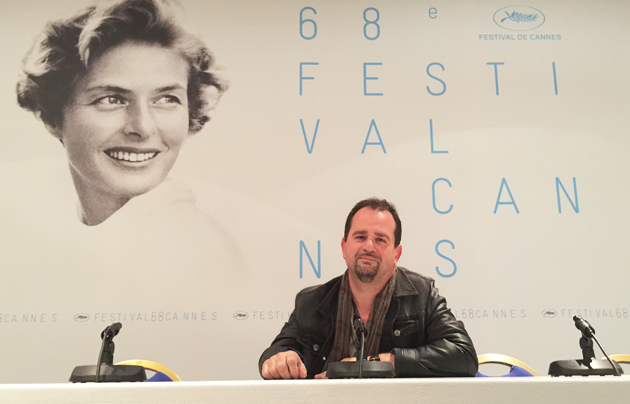Cannes International Film Festival review
Jean-Luc Gadreau, French pastor and member of the Ecumenical Jury of the Cannes International Film Festival, analyses this year´s edition.
CANNES · 10 JUNE 2015 · 11:51 CET

The 68th edition of the Cannes International Film Festival has already bowed out. The juries have proclaimed their charts giving some to rejoice and others to be different disappointed.
This cultural event is considered one of the most important in the world, twelve days of cinema, meetings and exchange. I had the privilege to be part of for the fourth consecutive year as a member of the Ecumenical Jury. Once home, the question everyone generally asks — "So, was it a good year?" — still requires some thought.
As I said, subjectivity is necessary while living a festival or, just simply, watching a movie. Many external factors influence you, promote a feeling or parasitize you. A quick comparison between the final prize list and the predictions of journalists (or even mine, for that matter) will make you realize that "there's a kind of bug somewhere…"
But I still dare to answer the question about my general opinion of the festival, by saying that 2015 will remain, to me, averagely vintage, pretty linear, without great extremes, nor in heights or in depths. Overall, a selection of quality, honest and interesting movies.
We can notice several things in the films that were presented this year. First, the need to evoke the difficulties of human relationships, family, and especially within the couple... I am thinking about "The Lobster", "Carol", "Youth", "Madre Mia", "Our Little Sister", "The Sea of Trees", "My King", "Valley of Love" and even the allegoric "Tale of Tales".
Many also tell social stories that are related to the contemporary reality of a suffering society, like the French movies "La Tête Haute", "Le Choix du Marché", "Dheepan" and the Mexican "Chronic", or a dark and difficult past like "The Son of Saul". One could feel that the concept of creating movies with significance was very strong, and generally outweighed the entertainment side.
My own preference went to movies that have managed to bring up both aspects, addressing social themes but wrapping all this with a delicious amount of humor, like the two genius Italian directors and main prize list’s great forgottens Nani Moretti and Paolo Sorrentino, and their films "Madre Mia" and "Youth", and Yorgos Lanthimos’s nugget UFO "The Lobster".
All these films will be great ways to spark off debate, and I can only encourage you to use them, to go watch them and start talking about them to others. This is one of the great joys cinema can offer us: parables for today that make us think, see, hear and understand.
The Ecumenical Jury strikes me more each year as a particularly useful and interesting thing in the context of such a festival. A "christian presence" and an official jury, which is not to censor, say what's right or wrong, but simply be there. It shows the real dimension of what being "salt and light" means.
A jury that recognizes, in the official selection, the movies that make sense in a Christian perspective on contemporary society. A christian presence that provides opportunities for festivalgoers and all christians present in the city during the festival to be together in various celebrations.
A jury which allows to discuss the films seen and organize conferences about cinema and faith on the ecumenical Jury stand at the International Film Market. All this offers real opportunities to witness about their faith individually or through the press, radio, internet ... a Catholic confessional TV or an Iranian national TV.
And the Christians inside the festival finally prove quite numerous. Over the years, I have met more and more of them, from moviegoers to professionals... Filmmakers, artists, employees of companies of the «world of the 7th art».
Like Esteban Zúñiga, a young evangelical Mexican director with a short film selected for the third time in the short programs section. Or this delicious meal shared with Steve Taylor, one of the big American stars of contemporary Christian music, discovering the festival as a young director. In a contemporary society where Christians have lost their impact in arts and culture, we can see encouraging signs for which we can pray.

This Ecumenical Jury also often proves to be full of interest and discernment (maybe we can see the secret help of the Holy Spirit inspired discreetly...). Simply browse for example the pages of this book published last year — "40 Years of Cinema through the Price of the Ecumenical Jury at Cannes" (Lulu.com editions) — to see the quality of the winning films.
To name a few: "Paris, Texas" by Wim Wenders, "The Sacrifice" by Andrei Tarkovsky, "Libera me" by Alain Cavalier, "Land and Freedom" by Ken Loach, "Secrets and Lies" by Mike Leigh, "Eternity and a Day" by Theo Angelopoulos, "Caché" by Michael Haneke, and more recently "The Hunt" by Thomas Vintenberg, "The past" by Asghar Faradi or last year’s magnificent "Timbuktu" by Abderrahmane Sissako.
These last two years, the Ecumenical Prize went to a film that marked many people, a Palme d'Or favorite for many journalists, yet missing from the Grand Jury’s prize list. "Madre Mia" by Nanni Moretti may have, and I sincerely hope will have, a future like "Timbuktu".
One of the specificities of the Ecumenical Jury compared to other juries is that they motivate their choices by a short text allowing everyone to discern what influenced their selection. For instance, "Madre Mia", a well-crafted, fine film suffused with humor that elegantly explores the human journey from loss to new beginnings.
“Madre Mia" is the story of a filmmaker (Margherita Buy) shooting her new film with an American actor (John Turturro) who obviously has some memory problems and practices Italian, he endures sentimental separation and supports his mother during her last days, giving himself the opportunity to confront his identity with human relations.
The greatest trials, particularly those that make us rub shoulders with death, often instigate an insight on one’s identity, one’s past and, possibly, a more or less foreseeable future. So we start with a strong and difficult story but we get through it with a certain lightness by constant alternation between sensitivity and laughter (thanks to the sublime performance of John Turturro).
Two other films have been honored by the Ecumenical Jury with a special mention: first, in the official competition, the French film by Stéphane Brizé "La loi du marché" with an exceptional Vincent Lindon who also received the best actor award. A social film, a rare genuine strength that makes this story a kind of docu-reality.
The Ecumenical Jury chose it for its prophetical stance on the world of work and its sharp reflection on our tacit complicity in the inhumane logics of merchandising.
And finally, in the selection "Un certain regard", Filipino Brillante Mendoza’s film "Taklub" was awarded for the sensitive portrayal of individuals and communities working for life in the midst of suffering and death in the shadows of natural catastrophes in the Philippines.
Finally, in the various official prize list juries, I shall point out several awards that particularly pleased me (and remain silent on the rest):
The film "Paulina", by Argentine Santiago Mitre, received the Grand Prize of the Critics' Week, a parallel section of the Cannes Film Festival. The price was awarded by a jury chaired by actress and Israeli director Ronit Elkabetz. The second feature of Santiago Mitre after "The Student", "Paulina" tells the story of a bright young woman who gives up her career as a lawyer to become a teacher in a disadvantaged region of Argentina. A good choice for an ever so exciting parallel selection.
Please also note that in the same selection, this year's Golden Camera award for the best first film at Cannes was given to Colombian César Augusto Acevedo for "La Tierra y la Sombra", the story of Alphonso, an old peasant who returns home to the bedside of his sick son, 17 years after abandoning his family.
"Saul Fia" (The son of Saul) directed by László Nemes has been recognized by several juries, receiving both the Grand Prize, the FIPRESCI prize of the international press and the François Chalais prize. Such a reward is well-deserved for a work that will stand in the way of approaching the Shoah in movies. A very strong film that brings us to the heart of the crematoria, with tension becoming a form of constant oppression to the viewer, but also gives a very special power in the treatment of this terrible subject.
Well, what is still missing from the list is "Youth" by Paolo Sorrentino... my personal and a large number of festivalgoers´ golden palm.
And so now… happy movie’s year and I give you an appointment at the 69th edition of the Cannes Film Festival.
Jean-Luc Gadreau is a pastor in Poitiers (Center-Ouest of France). He is a well known musician, singer and writer. Member of ecumenical Jury in Cannes (2012) and Berlin (2013) movies festival, he is member of Interfilm, the international interchurch film organisation.
Published in: Evangelical Focus - Features - Cannes International Film Festival review
